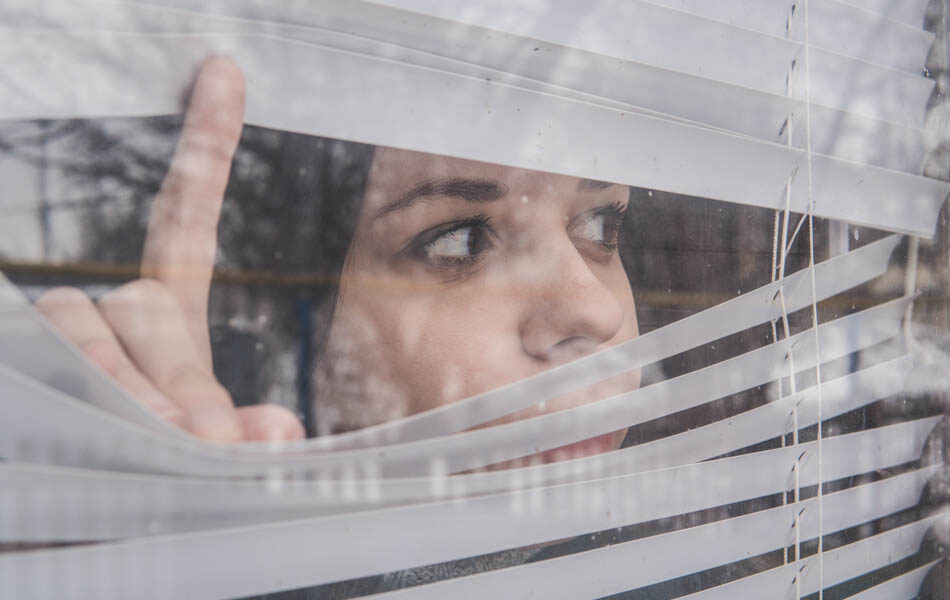How to Stop Being Paranoid and Take Control of Your Thoughts
Paranoia can consume your thoughts. It makes you feel uncomfortable and can wreak havoc with your mental health. So, overcoming paranoia and other negative thoughts is important for your overall wellness. Here you can find 7 actions that may help reduce paranoid feelings.

Most people experience paranoia at some point in their lives.
Although paranoia usually comprises irrational thoughts, mild paranoia symptoms are a normal human response and may occur primarily during times of stress. There are different types of paranoia, and the experience of feeling paranoid can differ from person to person.
Sometimes, symptoms of paranoia can indicate a mental health condition. In this case, a person may require professional help from a mental health expert. Whatever the cause, paranoia can disrupt your day and cause great distress. So, it’s necessary to take action.
This article covers coping strategies to deal with paranoid thoughts.
7 Tips to Cope if You’re Living With Paranoia
- Practice meditation
- Don’t drink alcohol
- Reduce your caffeine intake
- Exercise more
- Keep a journal
- Acknowledge your feelings
- Consider therapy
How to Stop Being Paranoid: 7 Tips to Help You Today
If you have trouble coping with paranoid thoughts, there are several techniques you can try at home to reduce symptoms. Self-care is essential to managing your anxiety levels, as taking care of yourself physically and emotionally can combat those negative feelings.
Here are 7 steps you can try that promote positive feelings.
#1 Practice meditation
Meditation is an excellent remedy for relieving anxiety and stress, as it creates a sense of peace and calm. The ancient practice is known to decrease negative mood and improve attention and memory. It can help focus and direct your thoughts toward healthier avenues.
Studies show that mindfulness-based interventions, like meditation, can significantly lower levels of non-clinical paranoia. It also shows potential for managing symptoms in patients with paranoid schizophrenia by improving positive emotions and decreasing negative ones.
One way to ease yourself into meditation and other mindful activities is with the mental health app. Such smartphone apps serve as your mental health assistant using established therapy practices. They might help you create healthy habits with self-management tools and daily activities.
#2 Don’t drink alcohol
While alcohol can make you feel very relaxed, it can also cause anxiety and feelings of panic. Paranoia is also a common psychological effect of alcohol. Being intoxicated can alter how you perceive things, leading to misinterpretation of certain scenarios that make you feel paranoid.
Anxious thoughts may increase the day after alcohol consumption, as hangovers have adverse effects on cognition and mood. It’s best to eliminate alcohol from your diet if you are trying to cope with mental health conditions, as it may induce paranoia or worsen existing symptoms.
Furthermore, heavy drinking, alcoholism, and alcohol withdrawal can induce alcohol-related psychosis – a condition characterized by hallucinations and paranoia.
#3 Reduce your caffeine intake
Caffeine has several health benefits when consumed in moderation. However, too much caffeine brings adverse side effects, like increased heart rate, anxiety, restlessness, and insomnia. These effects can remove your sense of calm and contribute to paranoia.
Caffeine consumption may also contribute to an increased risk of psychosis, which causes hallucinations and delusions. If your anxiety or paranoia starts or heightens after drinking tea, coffee, and other caffeinated beverages, reducing your daily intake is a good idea.
Most healthy adults can tolerate up to 400 milligrams of caffeine daily, but the stimulant can affect people differently. Try cutting back on how much you drink daily, or opt for decaffeinated beverages for the same taste without the nasty side effects.
#4 Exercise more
Exercise is a fantastic resource for your physical and mental well-being. Regular physical activity can reduce stress, anxiety, and symptoms of depression and low self-esteem. Having these symptoms can increase your chances of experiencing paranoia and anxious thoughts.
Meanwhile, exercise can boost self-esteem, improve cognitive function, and promote healthy sleep. Even small bouts of activity can have a significant impact. You could try working out twice a week, with activities like brisk walking or running in the morning to help clear your mind.
#5 Keep a journal
Journaling is an effective tool that is frequently used in the management of mental illness.
Keeping a journal helps train your mind and identify patterns in your paranoid thoughts. For example, you could write down your suspicious thoughts, when they occur, and how you feel about them. In time, you might see possible triggers and when to expect them.
Moreover, recording your thoughts on paper gives you a space to be completely open and honest about how you feel. It also offers an alternative view of your feelings, which may help you prioritize specific problems and concerns, so you can effectively begin to deal with them.
#6 Acknowledge your feelings
You shouldn’t ignore distressing feelings. Acknowledging how you feel can help you better understand your thought process. It can help you organize your feelings and determine whether your anxiety and fears are symptoms of paranoia or if you can justify feeling this way.
A good strategy is to ask yourself helpful questions. For example, you might ask yourself if there is credible evidence to support your fears. You can also consider how others might interpret your suspicions. Would a friend or family member feel the same in your situation?
#7 Consider therapy
You can try various methods to address your paranoid thoughts at home, but you can also benefit from speaking to a mental health professional. If anxiety, paranoia, and other negative emotions are affecting your daily life, it may be time to seek therapy.
There are lots of mental health services available – from anonymous therapy to online therapy platforms. A health professional can help you talk through your feelings and provide coping strategies to stop anxiety and irrational thoughts when they arise. They can also refer you for diagnosis of a possible mental health disorder.
Cognitive behavioral therapy (CBT) is the most common therapy for paranoia and anxiety disorders. It’s a talking therapy that helps you better manage your thoughts by altering the way you think and behave. It enables you to handle your problems more constructively.
What Is Paranoia?
Paranoia is the irrational feeling that you are facing a threat in some way, despite little or no evidence to support your feelings. People with paranoia tend to feel suspicious and distrustful of others’ intentions and may think they are being targeted or are in danger.
Anyone can have a paranoid thought, and mild paranoia is relatively common. Paranoid concerns affect the general population, but it doesn’t always indicate that you have a mental health condition. However, prolonged and severe paranoia can be a symptom of a mental illness.
Some symptoms of paranoia include:
- Stress and anxiety caused by paranoid thoughts about others
- Having difficulty trusting people
- Feeling like nobody believes you
- Defensiveness and being easily offended
- Being unable to compromise or accept criticism
What Triggers Paranoia?
Paranoia can develop for several reasons. In everyday life, sudden paranoid thoughts can stem from stressful situations and may be a potential sign that you are in danger. For example, you might feel paranoid about a stranger walking behind you while walking home alone at night.
Drug abuse is another critical trigger, particularly with recreational drugs like cocaine, LSD, and amphetamines. How much sleep you get can also affect your mental health. Poor sleep and sleep deprivation can trigger hallucinations and delusions that contribute to paranoia.
Mental health conditions are a major trigger of paranoia. It is prevalent among psychiatric disorders, such as paranoid personality disorder and borderline personality disorder. The cause is unclear, but genetics and environmental factors are thought to play a role.
Can Anxiety Make You Paranoid?
Yes, anxiety can make you paranoid. Furthermore, you might feel more upset about paranoid thoughts if you are already battling anxiety. That’s because anxiety can distort your thinking, which may make you interpret situations negatively, leading to paranoia.
Being anxious can also affect how long your paranoid feelings last. Interestingly, it works the opposite way, too. While anxiety can make you feel paranoid – feeling paranoid can make you anxious. The two emotions often stem from one another and can exaggerate the symptoms of each.
What’s the Difference Between Paranoia and Anxiety?
Although they often accompany each other, paranoia and anxiety are two different things. Both can trigger irrational thought patterns, typically arising from the body’s response to danger or a perceived threat. However, paranoia and anxiety require a separate diagnosis.
Paranoia is primarily defined by unjustified suspicion about others’ intentions. It can include delusional beliefs about various things, such as persecution, jealousy, and conspiracy theories. Mild paranoia could result from something as minor as misinterpreting what somebody said.
Anxiety is described as a feeling of unease. You may feel worried or fearful of something, with symptoms ranging from mild to severe. It’s a completely normal emotion that occurs in response to threatening situations. It is the body’s way of reacting to stress and preparing itself.
Still, anxiety can be more than a natural emotion. Some people have trouble controlling anxious feelings and may feel constant worry. This can be a sign of an anxiety disorder, such as generalized anxiety disorder (GAD), which makes you anxious almost all the time.
Symptoms of anxiety include:
- Feeling uncomfortable, nervous, and restless
- Feeling irritable
- Feeling a sense of impending doom
- An increased heart rate
- Excessive sweating
- Rapid breathing and even chest pain
- Muscle tension
- Difficulty concentrating or thinking about anything else
- Difficulty falling asleep and sleep disturbance
- Being easily fatigued
A Word From a Psychologist
Paranoia is an unpleasant feeling. It brings repetitive, intrusive thoughts that people often find incredibly distressing. It can make you feel anxious, frightened, and alone. If left untreated, symptoms of paranoia can worsen and leave you feeling even more isolated.
Treatment for paranoia usually depends on the severity of your symptoms. In the case of a psychiatric disorder, medication may be necessary. Psychotherapy is another treatment option that assists an individual in changing their behavior and overcoming their problems or trauma.
In less severe cases, you can use self-help tools to cope with your thoughts. You can practice these strategies alone or carry them out alongside treatment from a healthcare professional. Helping yourself with daily rituals and positive habits can make you feel more in control.
Getting enough sleep, eating a nutritious diet, and working out regularly are key ways of looking after yourself. Going for daily walks is a great way to spend time outdoors. Exposure to nature is associated with several mental health benefits, including improved brain function.
You can use mindfulness techniques at home to help you relax and manage your stress levels. Meditation, stretching, and yoga are good examples of relaxation methods. There also are neuromodulation gadgets that are proven to help. Additionally, recording your feelings in a journal can assist you in making sense of your thought processes.
If you’re unsure about talking to your doctor, try talking to a friend or family member. Sharing how you feel with others is another way to reflect and make sense of your thought patterns. It can also conclude whether your feelings or symptoms of paranoia are justified.
If you have signs of an anxiety disorder, it’s best to talk to your doctor.
Conclusion
Stopping paranoia is easier said than done, but there are many ways to take action and improve the way you manage your thoughts. Self-care is an essential practice that promotes greater mental well-being, and a healthy mind is an excellent step toward battling anxious feelings.
Most of us have felt paranoid at some point, but not everyone experiences this unpleasant symptom consistently. It’s important to seek help from a mental health professional if you cannot shift paranoia symptoms. They can guide you toward the most appropriate action.

















































 Select your language:
Select your language: 








